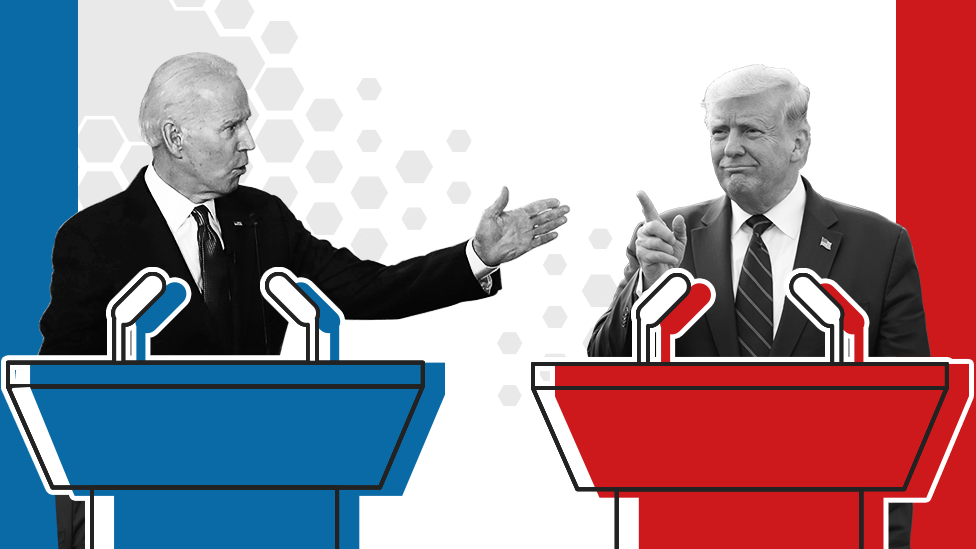Students weigh in on final presidential debate

After a noticeably chaotic first debate, USF students are gearing up for a night that could consist entirely of a muted microphone-induced shouting match between the 2020 presidential candidates.
President Donald Trump and former Vice President Joe Biden will take the debate stage tonight at 9, at a distance, to discuss topics such as continuing the fight against COVID-19, national security, climate change and racial injustice in the country.
USF students are hypothesizing and dissecting the components and effects of the debates. However, most are in agreement that their votes are decided, regardless of the content.
The debate will take place at Belmont University in Nashville, Tennessee. The candidates will be present but socially distant, unlike the second planned debate, which was converted into two simultaneous town halls after Trump recovered from the effects of COVID-19.
The candidates will reportedly have their microphones muted outside of their designated speaking times. This was a debated subject among students like freshman health sciences major and member of College Democrats club Tamya Ticconi.
“Muting the candidates’ mics isn’t a bad idea,” she said. “I understand that some past interruptions were important points that needed to be made, but it made the whole debate look unprofessional and hard to understand.”
Issam Halabi, a senior majoring in information technology, and treasurer of the College Republicans club, was torn about the potential muting of microphones. He said that typically he would not be supportive of the censoring, but acknowledged that it could be a good thing if it forces Biden to answer questions that he has previously brushed aside.
“It is just Trump saying his ideas and Biden saying ‘you’re bad, you’re bad, I’m not Trump.’ Biden won’t answer any questions, so I don’t think this helps the format, but maybe it does,” he said. “Maybe because of the format Biden will have to answer questions now. He can’t just say ‘Trump’s interrupting me.’”
Adriana Robertson, a sophomore social science education major, does not foresee this debate being different from the first in terms of candidate disposition.
“They both have their own debate styles and they’ll probably be consistent with it,” she said.
Sophomore political science major and member of the College Democrats club Monica Smith anticipates the same.
“I am expecting it to be the same as the first one,” she said. “It won’t be a true debate and will just be Trump trying to smear Biden’s name while Biden gets snarky on stage. I think both sides will avoid answering questions and it won’t be that beneficial.”
Some students cited the first moderator, Fox News anchor Chris Wallace, as the source of the chaotic energy of the initial debate.
“I thought the first moderator was terrible,” Halabi said. “He’s never been good. I thought the moderator for the vice presidential debate [USA Today’s Susan Page] was much better. I thought she stepped in when she needed to and she let [the candidates] talk when it made sense for them to talk.”
This debate will be moderated by NBC News White House correspondent Kristen Welker, who moderated an MSNBC Democratic debate in 2019. Students have much higher expectations for her.
“She has experience from the Democratic presidential debate last year,” Ticconi said. “She kept the debate interesting and controlled. I think she will do a notable job.”
Robertson said she would like to see some form of fact-checking occur at the debate.
“There was a lot of false information being spewed during the first debate and it was frustrating to watch while knowing the general population might not know the candidates were being untruthful,” she said.
Other students also felt frustrated that certain topics weren’t covered enough during the previous debate. Sophomore psychology major Cheyanne Cartales was hoping to see COVID-19 and climate change on the list of topics tonight because she feels that they are wedge issues.
“I feel like maybe if they’re talked about more it could change people’s votes,” she said. “I would also like to know each sides’ policies better, because those are the most important factors to me.”
Halabi said he was upset that Biden did not answer when asked if he would add Supreme Court justices past the nine-justice precedent in the first debate and was even more disheartened to see that it was not a topic selected for this one.
“I would like an answer on that because if you’re going to pack the court, that is a huge thing,” he said. “If you are going to vote, one way or another, that’s not something small. This isn’t filling a seat or filling a vacancy, this is restructuring the entire government. It would fundamentally change our country if you packed the Supreme Court.”
Regardless of the topic, Ticconi hopes that candidates speak more thoroughly about their plans this time around.
“The last debate did not provide substantial plans for topics discussed,” she said. “I believe Americans need to know how change will be created, not just what the candidates want to do.”
While students have said they want more fact-checking and different topics addressed to improve the content of the debate, most agreed that watching will have no effect on their vote.
“I’ve done a good amount of research on both candidates and I feel very set on who I prefer,” Robertson said.
Some are breaking out the popcorn, anticipating a similar spectacle as the last.
“I expect memes and for it to be entertainment more than anything else,” Smith said.






